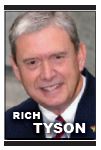Richard Tyson
Our choices are everything. They determine the path we will take, and they ultimately define our outcomes, or, as the late business sage Clayton Christensen has said, “how we will measure our lives.”
Our nation was founded on the premise that all men are created equal with the inalienable rights to life, liberty and the pursuit of happiness. These rights extend to each individual the opportunity{mprestriction ids="1,3"} and responsibility to choose what we will do with our lives, with our God-given freedom and our pursuits.
On any given day, we each make hundreds of choices: what to wear, what to eat, and what to do – including whether to work or play, read or watch television, exercise or relax. Much has been written on how we decide what to do, along with wise counsel not to become compulsive about every choice we make. In that regard, noted authors have wisely suggested that some choices should be made only once, then transforming them into habits, daily routines that don’t require thought. We simply get out of bed each day, shower and apply deodorant and proceed with our standard daily regimen.
When we make the choice to add a new discipline like exercise, the more capably we transform this into a habit, the more effective this choice becomes in getting us to the health benefits we desire. Habits, used effectively, can be very beneficial in bringing about success in new and ongoing goals.
Major goals reflect the broader choices in our careers, in our businesses, and in our lives. They help us define strategies, what we will and will not choose to do to achieve our goals. It is here that choice becomes more complicated. How does one choose what to do in their career and their life?
I have dedicated much of my career to learning how such choices are successfully made. It seems that inevitably it comes down to the propensity of the decision-maker to be either deliberative or decisive. Entrepreneurs, especially young entrepreneurs, tend to lean toward being decisive rather than deliberative. Decisiveness is good, but when it becomes impulsive, it often leads to failure and regret. Making major goal and strategy choices in an impulsive manner is dangerous.
On the other hand, being too deliberative can be equally dangerous. In his book The Paradox of Choice, Barry Schwartz cautions that maximizers often seek tremendous amounts of data and support before they are willing to make a choice. They suffer from “analysis paralysis,” often losing opportunities because of their endless search for the very best approach. Schwartz suggests that while we should pursue excellence, we will find greater success in being satisficers instead of maximizers. In other words, we must consider the question: At what point is this goal and strategy good enough? When we get our answer, we are ready to decisively move forward.
Clayton Christensen’s book How Will You Measure Your Life? suggests three important perspectives for us to deliberate on when making these broader existential choices:
• How can I be sure that I’ll find satisfaction in my career?
• How can I be sure that my personal relationships become enduring sources of happiness?
• How can I avoid compromising my integrity — and stay out of jail?
The answers to these questions should reflect your personal passions, interests and inherent gifts and talents, along with your commitment to the people in your life, as well as the values and beliefs that define you.
As I have become an older man, one thing is abundantly clear to me: I will not get out of this alive. As sobering as this thought is, it is also empowering. However long (or short) the years ahead of me, I have the gift of choice. Even as my mind and body age, I can choose my course; I can still pursue a variety of goals and strategies that enrich and inspire me. The gift of choice is an amazing elixir!
Whether you are young or old, just launching your career, or deciding how to use your retirement years, I wish you the very best in how you use your precious gift of choice.
Richard Tyson is the founder, principal owner and president of CEObuilder, which provides forums for consulting and coaching to executives in small businesses.{/mprestriction}








